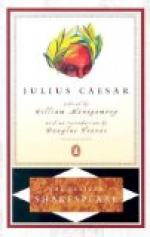|
This section contains 7,926 words (approx. 27 pages at 300 words per page) |

|
SOURCE: “No Spectre, No Sceptre: The Agon of Materialist Thought in Shakespeare's Julius Caesar,” in English Literary Renaissance, Vol. 26, No. 2, Spring, 1996, pp. 313-32.
In the following essay, Buhler regards the Epicurean skepticism of Cassius in Julius Caesar as it illustrates the play's concern with political materialism.
Postremo cur sancta deum delubra suasque discutit infesto praeclaras fulmine sedes, et bene facta deum frangit simulacra suisque demit imaginibus violento volnere honorem?
(Lucretius, De rerum natura 6.417-20: Lastly, why does he shatter holy shrines of the gods, and even his own illustrious habitations, with the fatal thunderbolt, why smash finely-wrought images of the gods and rob his own statues of their grandeur with a violent wound?)1
In Julius Caesar, Shakespeare depicts a cosmological as well as a political struggle. The correspondential order of things is manipulated on all sides of an increasingly bloody conflict, and the downfall of one faction occurs...
|
This section contains 7,926 words (approx. 27 pages at 300 words per page) |

|


